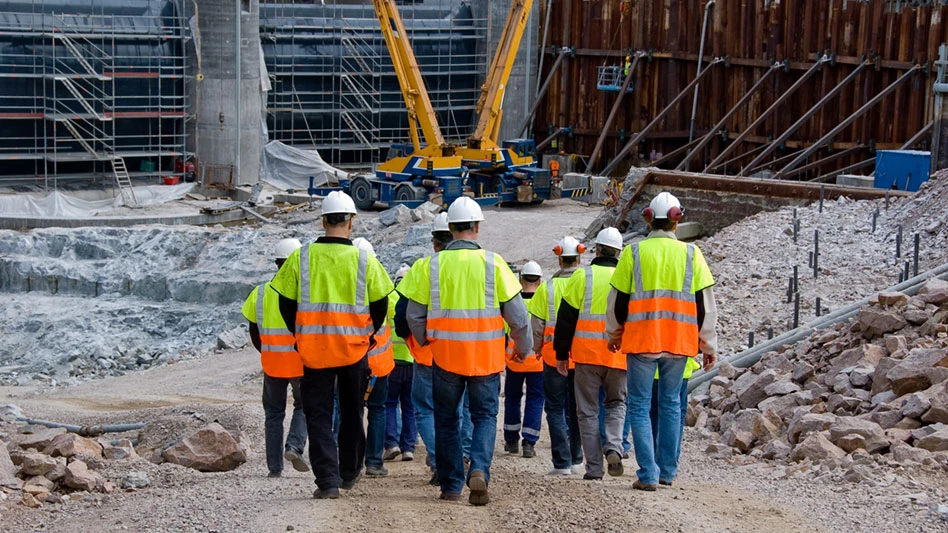
Tund | stock.adobe.com
The Arlington, Virginia-based Associated General Contractors of America (AGC), citing government data, reports that construction employment increased in 29 states this June compared with the prior month and in 35 states compared with one year earlier.
“Construction employment continues to rise in a majority of states despite slowdowns in multifamily and commercial projects,” says Ken Simonson, the AGC’s chief economist. “Finding qualified workers to execute huge data center, manufacturing, energy and infrastructure projects is a challenge in many states.”
In the 13-month stretch, New York shed the most construction jobs nationally, with 5,400 fewer people on construction payrolls this June compared with June 2023.
Other states with fewer construction workers on the job compared with one year ago are Colorado (-4,200 jobs), Maryland (-4,200 jobs) and Oregon (-2,300 jobs). By percentage, the largest payroll reductions occurred in the District of Columbia (-4.7 percent) and Maine (-3.8 percent), followed by Maryland, Colorado and Oregon with drops of less than 3 percent.
The biggest year-on-year construction payroll growth in absolute numbers was in Texas (36,100 jobs), followed by Florida (29,900 jobs), Michigan (14,400 jobs) and Nevada (12,800 jobs). By percentage, payroll growth was healthiest in Alaska (19.5 percent), followed by Nevada (11.5 percent), Hawaii (10.5 percent) and Michigan (7.6 percent).
In terms of recent, month-to-month payroll construction jobs growth, Texas (5,100 jobs), Ohio (3,600 jobs), Florida (3,400 jobs) and Nevada (3,300 jobs) are poised as construction hot spots this summer.
A problem could be looming for the construction sector based on survey results tied to the American Institute of Architects (AIA)/Deltek Architecture Billings Index (ABI).
That national survey of architectural firms indicates billings at such companies decreased for the 17th consecutive month this June, with a national score across subsectors of 46.4 (any score below 50 means that billings declined).
“Although somewhat fewer firms reported a decline in billings in June than in May, the majority continued to experience a decrease from the previous month,” say ABI co-organizers Deltek, a Virginia-based information services company, and the AIA, based in Washington.
The AIA and Deltek say indicators of future work remain “generally soft,” with slightly more than half of responding firms reporting an increase in inquiries into new work. Firms also reported a decline in the value of newly signed design contracts for the third consecutive month, according to the survey takers.
“While many firms still have a healthy backlog of projects in the pipeline, 6.4 months on average, this is the smallest that backlogs have been in more than three years,” the groups say.
Respondents to the ABI survey point to a potential decline in interest rates as a factor causing firms to remain generally optimistic that conditions will start to improve if or when that happens.
While architectural business conditions remained soft in most of the country in June, respondents located in the Northeast reported a slight increase in billings for the first time since January 2023.
The ABI survey organizers describe billings at firms with a multifamily residential specialization as “remaining soft."
“Conditions are now weaker at firms with other specializations for the first time in nearly two years, most notably at those with a commercial/industrial specialization," they say.
Latest from Construction & Demolition Recycling
- Bomag to showcase innovations on the National Mall
- NWRA, SWANA to partner on safety, education and advocacy
- Caterpillar announces collision warning system, other technology for medium wheel loaders
- ABC: Nonresidential construction adds jobs in April despite headwinds
- Demolition underway at former SC steel mill
- Turkey neglects US scrap in favor of Russian shipments
- Results of New Hampshire waste study reveal missed opportunities for diversion
- Alterra, Eco Materials open soil remediation facility in PA





